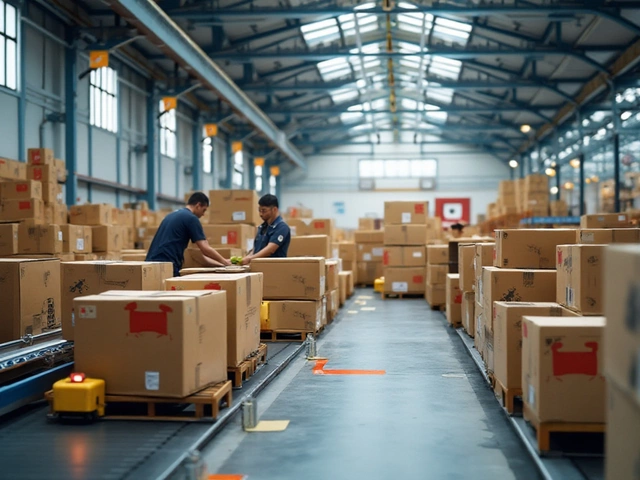Diving into the world of logistics is like embarking on a journey where precision meets unpredictability. The logistics industry often buzzes with the challenge of aligning numerous moving parts, from managing schedules to handling unexpected disruptions. These roles require not just a sharp mind, but also resilience under pressure.
Considering the fast-paced nature and high-stake outcomes, it's no wonder that stress management becomes a key component for anyone pursuing this career. It's important to remember that while the pressure can be significant, there are effective ways to manage it, making logistics not just a challenging field, but also a rewarding one for those who master the necessary skills and strategies.
- The Complexity of Logistics Tasks
- Pressure Points in Logistics Operations
- Stress Management Techniques for Logistics Professionals
- Building a Supportive Work Environment
The Complexity of Logistics Tasks
Stepping into the realm of logistics is akin to orchestrating a grand symphony, where each component must harmonize impeccably with others to ensure a flawless performance. The intricate web of logistics involves a myriad of tasks—from inventory management to transportation and warehousing, each carrying its unique challenges. Professionals in this field must possess an eagle-eye attention to detail, as even the smallest oversight can lead to significant delays or financial losses. Understanding the intricate nature of this domain is not just about knowing which products go where but about foreseeing potential chain reactions when a single link in the chain falters.
One of the core challenges that adds to the complexity of logistics is the ever-evolving landscape of technology. Staying current with the latest advancements, such as automation and data analytics, is not just an option but a necessity. These technologies offer the potential to significantly streamline operations; however, they also require logistics professionals to be continually learning and adapting. Those working in logistics must balance traditional practices with emerging technologies, ensuring that they can implement the best of both worlds. This blend of old and new can make logistics roles significantly challenging, raising the stress level experienced by many in the field.
"Logistics is the backbone of modern supply chains, and navigating its complexities requires not only strategic thinking but also resilience," Jane Doe, a logistics analyst, insightfully remarked.
Another layer of complexity is introduced through the global nature of today’s markets. Logistics managers often deal with the challenges of navigating international regulations, cultural differences, and geopolitical shifts. An unforeseen policy change or a sudden economic fluctuation in one part of the world can reverberate across supply chains, testing the agility and preparedness of logistics teams. Thus, geographical awareness and adaptability are crucial traits for those who manage such tasks.
The pressures don't stop there; logistical tasks are often time-sensitive, demanding quick, yet effective solutions. Meeting tight deadlines while maintaining high standards of efficiency and cost-effectiveness leaves no room for error. The fast-paced environment requires logistics professionals to not only be well-organized but also capable of multi-tasking effectively. In tackling these tasks, they must possess a strong ability to communicate, influence, and negotiate with different stakeholders involved in the supply chain.
Within such an environment, understanding customer needs and expectations becomes equally crucial. Logisticians are required to tailor strategies that will accommodate client demands while staying cost-effective. The balancing act between customer satisfaction and organizational profitability often adds another layer of complexity, as strategic decisions must align with both consumer desires and financial goals. This aspect highlights why logistics is not merely about moving goods from one place to another, but about creating solutions that are both innovative and sustainable.
Pressure Points in Logistics Operations
The logistics field can be likened to an intricate dance, where the rhythm of operations must be precise and well-coordinated. One of the major pressure points in logistics operations stems from the meticulous timing required in various tasks. Imagine managing the supply chain of a busy retail store; merchandise must be in place just in time to meet customer demands while avoiding overstock situations. Delayed shipments or excessive inventories mean lost revenue and increased costs, creating a constant tug between efficiency and expense.
Another critical stressor in logistics is the unpredictability of external factors. Consider the unexpected nature of weather disruptions, which can wreak havoc on transportation schedules. For instance, a blizzard could lead to postponed flights, grounding shipments, and impacting entire supply chains. This unpredictability requires logistics professionals to be adept at problem-solving, quickly formulating contingency plans to minimize the ripple effect across operations. A study pointed out, "About 60% of supply chain managers report that disruptions have a daily impact on their work.”
Technology, while a boon for efficiency, also poses its own challenges. Rapid advancements mean logistics systems must constantly update to stay relevant and competitive. This technological evolution demands familiarity with complex software systems and the ability to adapt quickly to new tools. A lag in technology implementation not only affects competitiveness but also adds to the pressure on logistics teams trying to keep pace in an ever-evolving landscape. There’s often a need for ongoing training and development, which translates to additional time and resource investments.
Communication roadblocks can also escalate stress levels in logistics. Consider the network of manufacturers, suppliers, carriers, and vendors all needing to sync with each other. Miscommunications can lead to mistimed deliveries, incorrect shipments, and a breakdown in order processes. Building a robust communication framework often requires careful planning and continuous effort to ensure accuracy and transparency across all parties involved.
Human error remains another inevitable pressure point. With a multitude of components to manage, from inventory counts to scheduling, the margin for error can be small, yet the impact of mistakes can be significant. Organizations in logistics often strive to optimize processes to reduce human error, adding pressure on employees to perform with precision. Companies might find it beneficial to invest in training programs that not only enhance skills but also build resilience against the pressure of such responsibilities.
Moreover, regulations concerning logistics, including import and export laws, environmental compliance, and safety standards, add another layer of complexity. According to industry experts, navigating these regulations requires both precision and a keen understanding of varying international standards. Failure to comply can lead to fines, legal issues, and even operations shutdowns, making this one of the most pressing burdens for logistics managers.
Table of Common Disruptive Factors
| Disruptive Factor | Impact |
|---|---|
| Weather Conditions | Delay in transport and increased costs |
| Technological Failures | Disruptions in communication and order processing |
| Regulatory Changes | Compliance challenges and potential fines |
| Supply Chain Disruptions | Poor inventory management and financial losses |
The logistics landscape is dynamic, presenting unique stressors that demand innovative solutions and strong managerial acumen. Embracing these challenges and turning them into opportunities for growth differentiates successful logistics operations.

Stress Management Techniques for Logistics Professionals
Working in the logistics sector can sometimes feel like navigating a ship through stormy seas. The unpredictable nature of supply chains, with all of its disruptions and demands, makes stress inevitable in such roles. Yet, it's not an insurmountable challenge. Understanding certain stress management techniques can transform this pressure into productivity, enabling professionals to maintain a balanced and effective approach to their tasks.
One valuable method is adopting a health and wellness routine. Regular exercise and a balanced diet can significantly alleviate stress. Engaging in activities like yoga or swimming can provide a peaceful counterbalance to the often chaotic logistics environment. Consuming nutritious foods helps maintain energy and focus, vital for handling emergencies and tight schedules that are characteristic of logistics jobs.
Another powerful technique is time management. It's essential for logistics professionals to develop skills that help them prioritize tasks effectively. The use of planning tools and apps can prevent the overwhelm that comes from last-minute rushes. By setting clear goals and breaking down tasks into smaller, manageable steps, stress levels can be kept in check, promoting a more controlled workflow.
Moreover, cultivating a supportive work environment plays a pivotal role. Organizations that encourage open communication and teamwork often see reduced stress levels among employees. Implementing regular check-ins and feedback sessions fosters a culture where all voices are heard, making problem resolution a shared effort. This not only helps in stress reduction but also enhances overall satisfaction in logistics careers.
According to a recent study by the American Psychological Association, workplaces that offer stress management programs witnessed a 25% uptick in productivity. This statistic highlights the significant impact that a structured approach to stress management can have on professional outcomes.
Finally, mindfulness and relaxation techniques can offer profound benefits. Practices such as meditation and deep-breathing exercises can help logistics workers maintain calm when faced with challenging situations. These techniques equip professionals with a clear mind to tackle problems more efficiently, turning potential breakdowns into breakthroughs.
"Stress should be a powerful driving force, not an obstacle." — Bill Phillips
By integrating these strategies, logistics professionals can build resilience and adaptability, transforming stress into a motivating force rather than a debilitating one. Embracing such techniques can lead to not only improved job performance but also enhanced personal well-being, making logistics a fulfilling and successful career path.
Building a Supportive Work Environment
Create a supportive work environment in logistics and you're laying the cornerstone for less stress and greater job satisfaction. It's not an easy task, but it's entirely possible with the right strategies and commitment. Understanding the unique stresses inherent to logistics, managers must proactively cultivate an environment where employees feel valued, understood, and empowered.
Communication plays a pivotal role in building this supportive culture. By encouraging open dialogue, company leaders can ensure that their teams do not just follow orders but contribute ideas, raise concerns, and share their valuable insights. Regular meetings, comprehensive feedback systems, and open-door policies are practical tools that facilitate this level of engagement. When employees see their voices mattering, their sense of ownership and accountability naturally increases, reducing work-related anxiety.
Another crucial aspect is investing in employee development. Offering training programs and workshops can help logistics professionals diversify their skills and adapt to the industry's evolving demands. These initiatives not only enhance personal growth but also improve team performance, reducing stress levels across the board. By demonstrating a commitment to development, companies send a strong message that employee contributions are valued and their futures within the company are important.
Henry Ford once said, "Coming together is a beginning. Keeping together is progress. Working together is success." His words underscore the philosophy behind a supportive logistics workplace. Teamwork is indispensable when tackling the industry's challenges, and building a strong team involves fostering trust and collaboration among members.
Moreover, celebrating successes and milestones, no matter how small, can boost morale and create a positive atmosphere. Recognizing efforts acknowledges the hard work logistics professionals put in daily. This recognition can come in many forms - monetary rewards, public acknowledgment, or even an extra day off - and should be a standard practice in companies that aim to retain their most talented workers.
The logistical field can also benefit from a healthy work-life balance policy. Respecting employees' personal time by setting clear boundaries between work and rest can significantly mitigate stress. Flexible schedules, remote work options, and supportive leave policies can all contribute to reducing burnout syndrome often seen in high-pressure environments like logistics.
To illustrate the importance of these strategies, consider the impact of proper stress management practices employed by top logistics companies. A survey showed that firms adopting supportive environments saw a 30% decrease in employee turnover and a substantial increase in productivity. This underscores that caring for the workforce doesn't just lead to happier employees but also to better business results.





